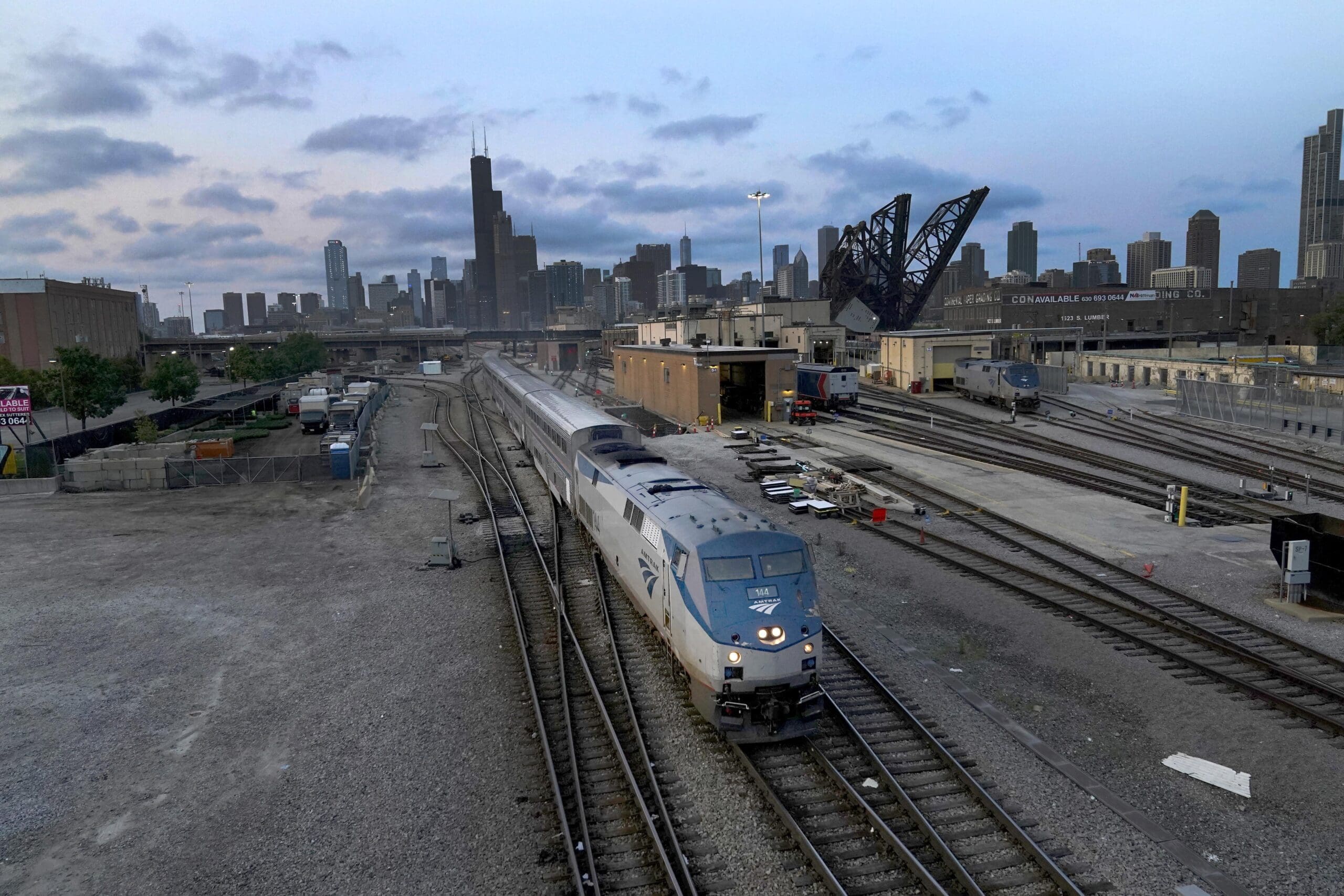
Rail union votes could force Congress to head off a strike

The two largest railroad unions will decide Monday whether to ratify a contract with freight railroads — and a no vote could force Congress to step in to avert a rail strike just before the holiday season.
A strike could happen as soon as Dec. 5 after the first cooling-off period ends for the 12 involved unions. That would leave a short window after the Thanksgiving recess for lawmakers to avert a work stoppage that could impede coal shipments, shut down most passenger rail, imperil drinking water and cost the economy billions per day.
If any of the unions fails to agree on a contract by their early December deadlines, none of the other unions would cross a picket line, likely triggering an industrywide strike. Three of the unions so far have rejected a tentative contract agreement proposal brokered by Labor Secretary Marty Walsh in September, largely because they’re holding out for more concessions from railroads on sick leave.
But the threat of congressional involvement, and especially looming Republican control of the House, could force the unions’ hand. Republicans say they’re ready to impose recommendations made in August by a board appointed by President Joe Biden that didn’t go as far to improve working conditions as the unions wanted. That means unions that have since negotiated better deals could see their gains erased.
“Look, what a terrible Christmas gift that would be to give to the American people at this point. Right before Christmas, shutting down our supply chain,” Rep. Rick Crawford (R-Ark.), the top Republican on the House subcommittee that oversees railroads, told POLITICO. “So we’ve got something prepared if necessary, but I’m hoping it’s not necessary.”
What happens in the next few weeks will test whether unions have the clout to end a lack of paid sick time and strict attendance policies in the industry.
Democrats are hoping they won’t need to get involved, but are also pushing railroads to make more concessions to appease rank-and-file union members who are angry over what they say are unfair scheduling and time-off policies.
“I’m hoping the railroads will get reasonable, this is the 21st Century and to have skilled workers being denied sick leave, even unpaid sick leave, is unconscionable,” said Transportation Committee Chair Peter DeFazio (D-Ore.). Freight rail companies “are watching their record profits, ‘Oh my God, if we give people paid sick leave our stock might drop by a dollar.’ Give me a break,” he said.
When told that House Republicans have legislative text ready, DeFazio hinted that their plan won’t get the support of Democrats during the lame duck session.
“Oh, good for them, they’re not in charge, so we’ll see,” DeFazio said.
The two unions that are expected to announce their contract ratification votes Monday are the SMART Transportation Division and Brotherhood of Locomotive Engineers and Trainmen, who collectively represent 50 percent of the roughly 125,000 freight rail workers involved.
How we got here
After months of trying and failing to come to a deal, Biden picked a board of advisers that recommended higher pay. But the unions rejected those recommendations and instead pushed for a contract agreement that included pay increases along with changes to railroads’ attendance policies.
In September, Biden and Walsh announced a deal that union leaders and the railroads agreed on. That deal then went to the unions’ memberships for a vote.
So far, three unions comprising about 25 percent of the coalition have voted the agreement down. Seven unions have voted to ratify the agreement, leaving the two largest unions as the final group to report their votes.
In October, the third-largest union of the 12 involved voted not to ratify the proposed contract amid rank-and-file members’ unrest.
Union leaders have been trying to wrangle their membership toward a deal, but an umbrella group of cross-union interests, Railroad Workers United, has been agitating for a no vote, stoking rank-and-file members’ anger. Many are unhappy with the deal, feeling it doesn’t do enough to address working conditions that have led to high attrition rates among workers.
Republicans in both chambers are more inclined to just impose the recommendations of Biden’s board, which does not go as far as most unions want. The review board recommended pay increases but did not weigh in on workplace attendance policies that are a major source of anger among workers.
Senate Commerce Committee ranking member Roger Wicker (R-Miss.) told POLITICO that he and Sen Richard Burr (R-N.C.) will push legislation that would mirror the review board’s recommendations, saying they are “prepared once again to bring this matter to the floor.”
“And we hope there’s a resolution before that. If not, Congress must act,” Wicker said.
Wicker and Burr previously tried to force a Senate vote on a resolution, S.J. Res. 61 (117), that sought to impose the review board’s recommendations from September, when it appeared a strike was hours away.
“Everybody told us, ‘Once that recommendation comes out, you get nothing more; you either make that a contract and ratify, or Congress is going to impose it,’ and [BLET President Dennis] Pierce and I said, ‘Absolutely not. We’re gonna go all the way to the end. We’re gonna push for more.’ And we ended up getting a lot more,” SMART-TD President Jeremy Ferguson said.
But Ferguson also acknowledged that a work stoppage probably wouldn’t happen because lawmakers from both parties are aware that a strike would be crippling economically and politically. He argued that whatever the ultimate resolution looks like, the unions have made significant progress.
“We got a lot out of this and maybe history won’t reflect that immediately. But 10 years from now looking back everybody’s gonna go, ‚Wow, that was a lot,’” Ferguson said. “Everybody always wants more.”
Eleanor Mueller contributed to this report.






